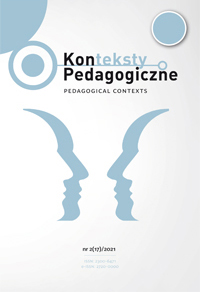Abstract
The dignity and subjectivity of every human should be the foundation of interpersonal relations. Unfortunately, many spheres of functioning are still not accessible to people with disabilities. Currently, in Poland, they are faced with stereotypical thinking and the necessity to overcome various barriers that still exist in their everyday life.
The purpose of this article is to consider the directives included in the new Act on ensuring accessibility to people with special needs in terms of arranging the space of integrated classes in terms of accessibility to meet the needs and expectations of people with disabilities. In the first part of the study, the analysis of the content of the Act on Providing Accessibility to Persons with Special Needs has been carried out. The second part is dedicated to the literature review on the arrangement of school classrooms.
References
Domagała-Zyśk, E. (2015). Projektowanie uniwersalne w edukacji osób z wadą słuchu. W: M. Nowak, E. Stoch i B. Borowska (red.), Z problematyki teatrologii i pedagogiki (s. 553–568). Lublin: Wydawnictwo KUL.
Gajdzica, Z. (2009). Wprowadzenie. W: Z. Gajdzica (red.), Człowiek z niepełnosprawnością w przestrzeni społecznej (s. 9–10). Kraków: Oficyna Wydawnicza „Impuls”.
GUS (2019). Oświata i wychowanie w roku szkolnym 2018/2019. Warszawa–Gdańsk: Urząd Statystyczny w Gdańsku.
Kowalski, P., Mikołajczyk, A. i Zimny, B. (2019). Jak wdrażać Ustawę o zapewnianiu dostępności? Łódź: Europejski Fundusz Społeczny.
Olechowska, A. (2019). Specjalne potrzeby edukacyjne w urzędowym dyskursie pedagogicznym. Warszawa: Wydawnictwo Akademii Pedagogiki Specjalnej.
Ostaszewska, E.D. i Wręga, A. (2017). Poradnik aranżacji sal lekcyjnych do nauki języka niemieckiego. Warszawa: Goethe Institut.
Pilch, T. (red.) (2006). Encyklopedia pedagogiczna XXI wieku, t. 5. Warszawa: Wydawnictwo Akademickie „Żak”.
Popławska, J. i Sierpińska, B. (2001). Zacznijmy razem. Dzieci specjalnej troski w szkole podstawowej. Poradnik dla nauczycieli szkół integracyjnych. Warszawa: Wydawnictwa Szkolne i Pedagogiczne.
Sadowska, S. (2006). W stronę innego spojrzenia na szkołę jako miejsce edukacji i rozwoju ucznia z niepełnosprawnością intelektualną. Potencjalne możliwości środowiskowe związane z typem szkoły. W: S. Sadowska (red.), Nauczanie uczniów z niepełnosprawnością intelektualną w stopniu lekkim. Wybrane problemy teorii i praktyki (s. 29–45). Toruń: Wydawnictwo Edukacyjne „Akapit”.
Smith, D.D. (2008). Pedagogika specjalna. Podręcznik akademicki, t. 2, tłum. J.A. Korbel, Z.S. Litwińska i M.E. Litwiński. Warszawa: PWN.
Szymczak, M. (red.) (2010). Słownik języka polskiego, t. 3. Warszawa: PWN.
Ustawa z dnia 19 lipca 2019 roku o zapewnianiu dostępności osobom ze szczególnymi potrzebami (Dz.U. 2019, poz. 1696 z późn. zm.).
Rozporządzenie Ministra Edukacji Narodowej z dnia 28 lutego 2019 roku w sprawie szczegółowej organizacji publicznych szkół i publicznych przedszkoli (Dz.U. 2019, poz. 502).
Wojtas-Rduch, A. (2020). Integrated Education – Spatial Organization of Classes. Konteksty Pedagogiczne, 2(15), 299–314.
Wojteczek, M. i Polak, M. (2016). Chcesz zmiany? Zacznij od ławek. W: M. Polak (red.), Przestrzeń fizyczna i architektoniczna. Przestrzenie edukacji 21. Otwieramy szkołę!, t. 1 (s. 40–41). Warszawa: [Centrum Edukacji Obywatelskiej].
In accordance with the recommendation of the Ministry of Science and Higher Education, which aims to counteract the practice of “ghostwriting” and “guest authorship,” all authors submitting their text for publication should attach an author’s statement which declares the contribution of each of the authors to the article. The printed and signed statement should be delivered by mail or other means to editor-in-chief Joanna Skibska or sent in the form of a scan to the following e-mail address: redakcja@kontekstypedagogczne.pl. The authors will not receive remuneration for publishing their papers. The editors reserve the right to make minor editorial changes to the articles which will not affect the substance of the article. We encourage all authors to prepare their articles in accordance with the guidelines for manuscript preparation. Download pdf file.
Authors transfer all copyrights and grant the journal the right of first publication with the work simultaneously licensed under a Creative Commons Attribution License that allows others to share the work with acknowledgement of the work's authorship and initial publication in this journal. All authors agree to the publishing of their email addresses, affiliations and short bio statements with their articles during the submission process.

